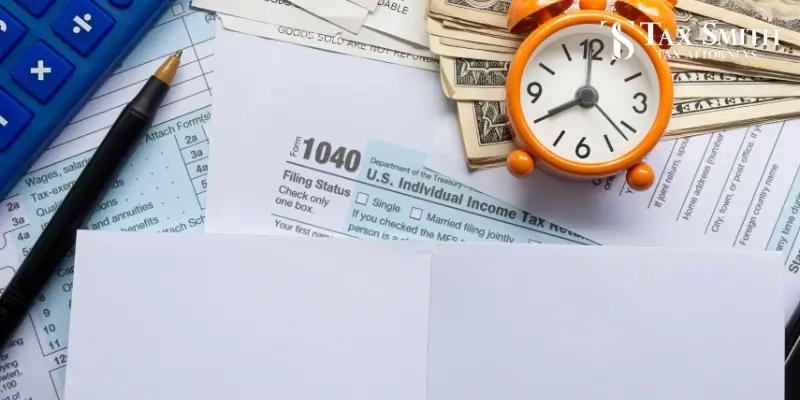1548 The Greens Way – Ste. 4 Jacksonville Beach FL 32250
Ponte Vedra Bank Levy Attorney
Ponte Vedra Bank Levy Lawyer
A bank levy can be placed by a creditor if you have failed to pay a debt and other collection methods have failed. This can be a terrifying situation to be in. The IRS (Internal Revenue Service) can also place a levy. Both the IRS and other creditors must provide certain notices prior to placing the levy. If you are facing a bank levy or notice of a levy, it is essential that you work with a Ponte Vedra bank levy attorney to protect your assets. Since IRS levies can be particularly complex, seeking advice from a Ponte Vedra IRS tax attorney can help you understand your options and work toward a solution that prevents further financial strain.
Tax Smith Tax Attorneys: Bank Levy Attorneys in Ponte Vedra
At Tax Smith Tax Attorneys, our team has worked in tax law for many years and has decades of collective experience. We want to help you with your tax issues. Our law firm can determine the ideal ways to resolve your tax debt and limit the impact of tactics like bank levies.
Our team provides compassionate and honest advice for individuals and families because we understand how upsetting this situation can be. A bank levy can severely impact your finances and your day-to-day life. We can work with your needs and your schedule to find creative solutions that can settle and limit your Ponte Vedra tax debt.

Understanding an IRS Bank Levy
Bank levies can be initiated by the IRS as well as by private and consumer creditors. Typically, private creditors must get court approval, but the IRS does not need this. The IRS can use a levy to freeze a bank account. It then removes the money from the account needed to pay back taxes and other debts.
A bank levy is not typically the first step that the IRS will take when an individual or business owes back taxes. Notices of nonpayment and other tactics may be used first. Bank levies and other serious actions are only taken when a taxpayer has a large level of debt and has taken no steps to cover their payments or create a plan with the IRS to repay their debt.
Prior to placing the levy, a creditor or the IRS will inform the individual of their intent to levy an account. This is typically done 30 days before the levy will affect an account. During this time, taxpayers should work with a tax attorney to contact the IRS to find alternate ways to settle and repay tax debt. Failing to take action will result in the levy taking effect.
Levies can be placed on any bank accounts and property that you own, along with any accounts or property that are yours but are currently held by another party. If you’re unsure how to respond to an IRS notice of levy, a Ponte Vedra tax attorney can guide you through the process and protect your rights.
The Process of Implementing a Bank Levy
When the IRS wishes to levy a bank account or other asset, there are certain steps that must be taken first:
- The IRS has provided you with a notice about your assessed taxes, which includes the taxes, fees, and interests owed. The IRS must only prove that they sent this notice, and it is not required to prove that you received it.
- The IRS must prove that you refused to pay the owed taxes or neglected to pay them.
- The IRS has sent you two follow-up notices, including a Final Notice of Intent to Levy and a Notice of Your Right to a Hearing. These notices inform the taxpayer of the levy and again provide the amount owed. These notices must be provided 30 days prior to any accounts or assets being levied.
- If the account is managed by a third party, such as a bank, employer, or other entity, the IRS must also send you a notice of Third-Party Contact when placing a levy, collecting debt, or calculating debt.
When you receive notice of a levy or hearing, you should take action quickly. It can be easier to negotiate, and will better protect your assets, if you can negotiate another way to pay prior to the levy being implemented. A tax attorney can help you decide the options available to you during this time and work to limit your tax debt and the effect of a bank levy.

FAQs About Ponte Vedra, FL Bank Levy Law
Does Florida Allow Garnishment of Bank Accounts?
Yes, Florida allows bank account garnishment by creditors. Some types of income are protected from most creditors, or have more limitations, such as veteran’s retirement benefits, Social Security benefits, and disability payments.
The IRS can garnish many types of income and earnings, including wages, retirement and pension earnings, and Social Security payments. It can also place levies on these accounts, preventing you from accessing these funds. There are certain wage garnishment protections if you are the head of household, but you must apply for these exemptions and protections.
What Type of Bank Accounts Cannot Be Garnished?
Bank accounts that cannot be garnished by most creditors include bank accounts open in states that do not allow bank account garnishment for small accounts. A joint account as tenants by entireties owned by spouses is also exempt from garnishment if only one spouse owes the debt. Unfortunately, these exemptions usually only apply to consumer debts, and the IRS can still garnish or place levies on these accounts.
How Do I Hide My Bank Account From Creditors?
There are several methods that may be able to protect bank accounts from creditor levies or garnishes, but these typically do not apply to methods used by the IRS to collect back taxes. These methods include:
- Open an exempt bank account, including exempt tenancy by entireties joint account for spouses, which cannot be impacted by debts that only one spouse has.
- Open an account in a state that prevents consumer creditors from garnishing bank accounts under a certain value.
- Open an offshore account, which does not prevent creditors from garnishment, but does make the process more complicated.
- Open a type of account that is protected from consumer creditors, such as pension accounts or Social Security payments.
Can a Savings Account Be Garnished?
Yes, a savings account can be garnished or levied in Florida. If the creditor is a consumer creditor or other creditor, they must petition the court for the right to garnish or levy a bank account to satisfy a debt. However, if the debt is unpaid taxes, the IRS or state government does not need court approval to place a levy or garnish an account. A garnish is an amount removed from the account to satisfy the debt, while a levy prevents you from accessing your funds in the account.
Work With Dedicated Tax Attorneys in Ponte Vedra
At Tax Smith Tax Attorneys, we have worked for decades in tax law and finding creative solutions to our community’s tax problems. Contact our team today.
Locations We Serve
- Alabama
- Arizona
- California
- Colorado
- Connecticut
- Delaware
- District of Columbia
- Florida – HQ
- Georgia
- Idaho
- Illinois
- Indiana
REQUEST A CONSULTATION
Please fill out the Contact Request Form and a Tax Attorney/Paralegal will call you
to discuss legal representation or to schedule your free initial consultation





